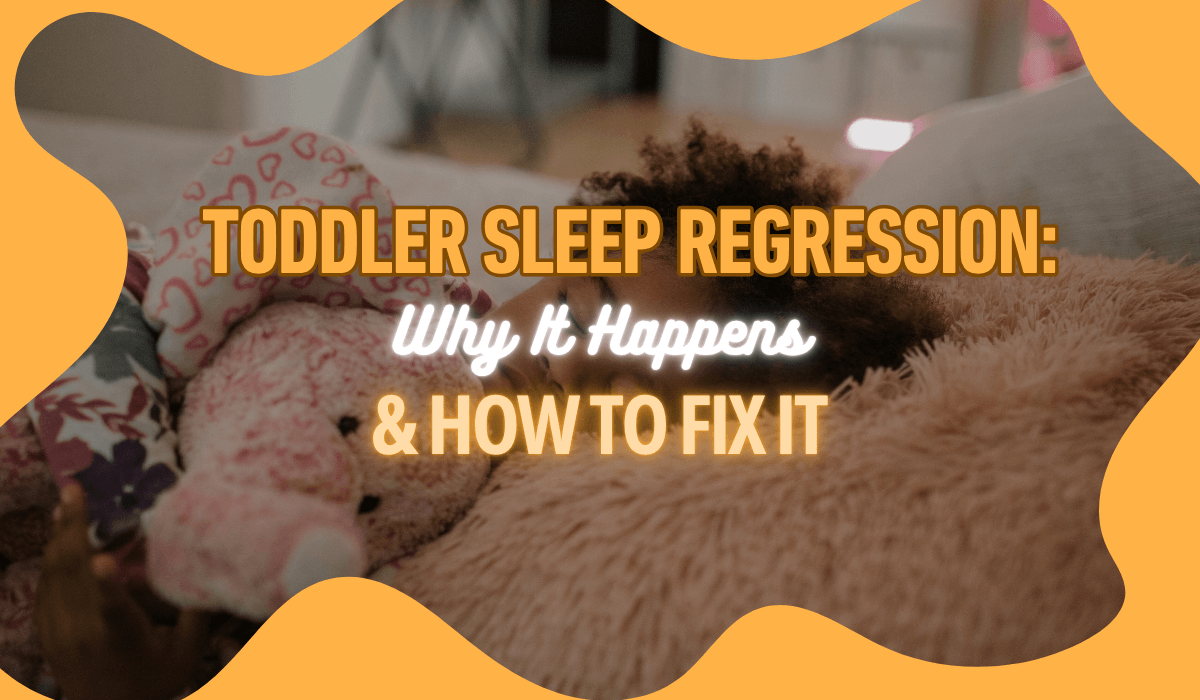If you’ve ever experienced your sweet, easy-sleeping toddler suddenly turning into a mini night owl, you’re not alone. Toddler sleep regression is a common and often frustrating phase that can leave you feeling like you’re back at square one. As if you weren’t already tired enough, right? 😅
But here’s the thing: toddler sleep regression is completely normal. It’s just a part of growing up, but it can definitely test your patience. Whether it’s refusing to go to bed, waking up multiple times during the night, or just generally refusing to sleep altogether—these disruptions can feel endless. So, what’s behind it all? And how do we survive it (with our sanity intact)? Let’s dive in. 👇
What is Toddler Sleep Regression?
Toddler sleep regression usually happens between the ages of 18 months and 3 years, but it can occur at any point during this stage of life. It’s when a toddler who has previously been sleeping well suddenly starts having trouble falling asleep, staying asleep, or both. Regression can last anywhere from a few weeks to a few months, but trust me, it will end (it always does). 🙌
So, why is this happening? Is your toddler secretly plotting to ruin your sleep schedule just to test how much caffeine you can handle? (I’ve been there, trust me).
Why Does Toddler Sleep Regression Happen?
Here’s the not-so-fun truth: toddler sleep regression is caused by a combination of developmental milestones, changes in routine, and sometimes even a little separation anxiety. Here’s a closer look at the most common culprits:
1. Developmental Milestones
Around 18 months, toddlers experience a surge of brain development. They’re learning new skills, like walking, talking, and problem-solving, which can disrupt their sleep patterns. These milestones can cause them to feel more energized or anxious, making it harder for them to settle down at night. 🧠
2. Separation Anxiety
As toddlers grow, they begin to understand that they are separate from their parents, and this can lead to separation anxiety, especially at bedtime. Your little one may resist being left alone in their crib or bed, even if they were fine with it before. This is totally normal, but it can make bedtime much harder. 😔
3. Teething Troubles
If your toddler is getting new teeth (which, let’s be honest, seems to happen non-stop), the discomfort can affect their sleep. Teething pain can make them more restless, causing them to wake up in the middle of the night or have difficulty settling down. 😖
4. Changes in Routine or Environment
Has your toddler recently started daycare, moved to a big kid bed, or gone through a change in their environment? Any disruption to their routine—especially big ones—can cause sleep regression. They might be adjusting to new surroundings, and their sleep cycle takes a hit. 🛏️
5. Increased Energy and Imagination
At this stage, toddlers are becoming more aware of their surroundings and their own emotions. They might get caught up in their newfound imagination, thinking about things like monsters or feeling anxious about the dark. These big feelings can make it harder for them to fall asleep or stay asleep. 🧸
How to Fix It (Without Losing Your Mind)
While toddler sleep regression is tough, it’s manageable with a little patience and consistency. Here are some strategies to help both you and your toddler get better sleep:
1. Stick to a Consistent Bedtime Routine
Kids thrive on routine, so it’s crucial to create a calming bedtime ritual. Whether it’s a bath, a bedtime story, or some quiet time, make sure you stick to the same routine each night. This can help signal to your toddler that it’s time to wind down and get ready for sleep. 🛁📖
2. Comfort and Reassure
If your toddler is dealing with separation anxiety or fears, offer comfort and reassurance without giving in to every demand. A quick cuddle, a reassuring word, or a nightlight can help ease their worries and give them the confidence to sleep.
3. Limit Screen Time Before Bed
As tempting as it may be to let your toddler watch TV or play on a tablet before bed, screens can actually make sleep regression worse. The blue light from screens can interfere with melatonin production, making it harder for your little one to fall asleep. Aim for at least 30 minutes of screen-free time before bed. 📱❌
4. Offer Comfort Objects
If your toddler is having trouble with separation anxiety, offer them a comfort object like a favorite blanket, stuffed animal, or a piece of your clothing. These familiar items can help them feel safe and secure when it’s time to sleep. 🧸
5. Be Patient (But Firm)
Toddler sleep regression can take time to work through, so be patient. It’s also important to be firm in your expectations. If your toddler keeps getting out of bed or refuses to sleep, calmly walk them back to bed and remind them that it’s time for sleep. You don’t have to argue—just be consistent.
Key Takeaways
- Toddler sleep regression is a normal phase that most parents will face, and it’s often caused by developmental milestones, separation anxiety, or changes in routine.
- While it may feel like it’s never-ending, rest assured that this phase will pass (eventually).
- Create a consistent bedtime routine to help your toddler feel secure and ready for sleep.
- Offer comfort without giving in to every request, and be patient as your toddler adjusts.
- If needed, consult with your pediatrician to rule out any underlying health issues that might be affecting your toddler’s sleep.
Final Thoughts: Hang In There!
Toddler sleep regression might feel like a never-ending cycle of sleepless nights, but remember—this is just a phase. With a little patience, consistency, and reassurance, both you and your toddler will get through it. And one day, you’ll look back and laugh (or maybe cry, because you survived). Either way, you’ve got this. 💪✨


